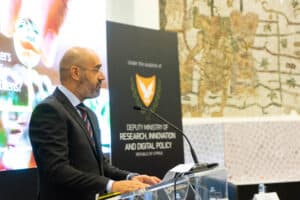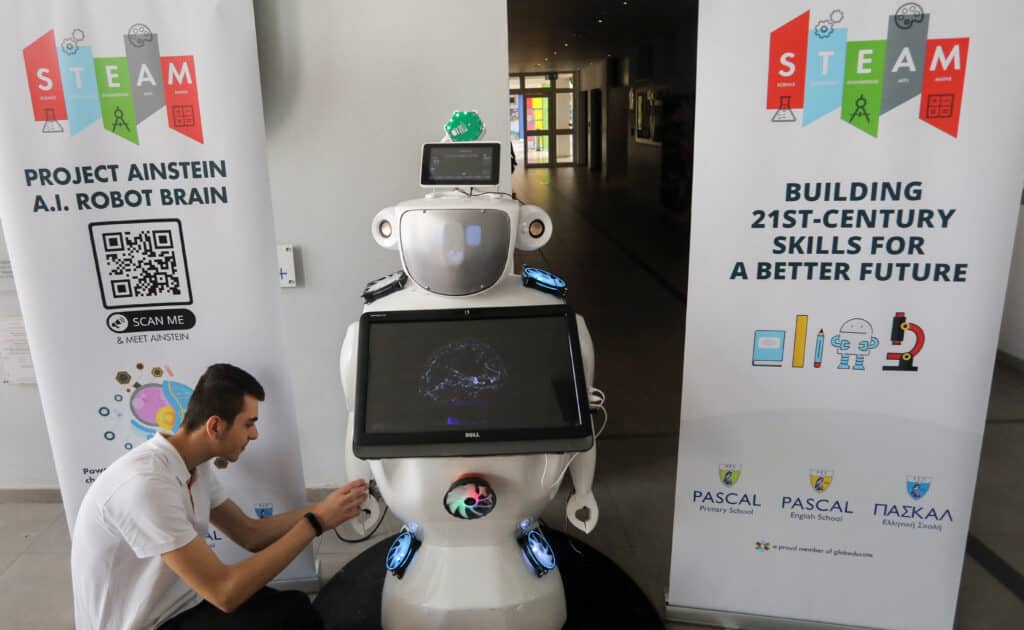With the launch of ChatGPT late last year speculation on its impact on the labour force has been largely negative but those in Cyprus see it could boost productivity, and reskilling
As countries around the globe look for ways to deal with and adapt to the use of chatbots, including ChatGPT, Cyprus too is set to see its labour market radicalised and the way in which services are offered changed, but officials are keen to stress the positive.
“AI can create new industries and jobs that were not possible before,” Labour Minister Yiannis Panayiotou told the Cyprus Mail, “such as those related to the development and maintenance of AI systems, data analysis, and machine learning, as well as opportunities for businesses to innovate, grow, and remain competitive, which can ultimately benefit employees”.
Regarding concerns that it would replace jobs Panayiotou said that AI technology is being used to automate repetitive and mundane tasks, which can free up humans to focus on more creative and meaningful work.
“That being said, it’s crucial for individuals and organisations to adapt and prepare for the changing nature of work brought about by AI and automation,” the minister added.
He said continuous upskilling and reskilling of employees is something the ministry of labour has been focusing on, especially under the 2023 European Year of Skills, which will help equip up to six million people in the EU with digital and green technology skills, empowering them to take on new roles and responsibilities.
Often looked at sceptically, the latest chatbot to have taken the world by storm is ChatGPT, an artificial-intelligence system (AI) developed by OpenAI and launched in November 2022, which seemingly has the potential to replace jobs. But, Cyprus is looking at it to increase productivity.
Business Consultant at PWC Cyprus Andreas Papadopoulos said it is hard to pinpoint what the effects would be on the labour market but added that it would surely be transformed.
“It will certainly transform some jobs with regards to their everyday tasks and processes, those occupations might need to be reskilled and upskilled in order to benefit from tools like ChatGPT.”
This seems to be a point of consensus. Lawyer Demos Georgiades also said the implementation of ChatGPT would require a lot of people working in Cyprus to develop new skill sets.
Impacts aside, the question is what are those on the island actually doing about it? Panayiotou said Cyprus is taking steps. “The Human Resource Development Authority of Cyprus, along with the Cyprus Productivity Centre, are currently developing very targeted training programmes to make sure that people acquire the necessary skills to stay relevant and effective in the labour market,” he said.
Speaking at an EY conference on Thursday on how technology can be used by public officers to better serve citizens, Deputy Minister of Research, Innovation, and Digital Policy Philippos
Hadjizacharias said that the civil service and all other sectors in Cyprus need to learn to adapt to use digital technologies for the benefit of the people.
He said this would require “taking advantage of the possibilities and opportunities offered by digital technology and strengthening the ability of each of us to take the lead in shaping our common future”.
He added that in this vein, programmes have been established for civil servants to provide them with knowledge and training in digital matters, and in particular in specialised subjects, which can be the driving force with which the state will collectively manage the great change that is taking place.
“For this purpose, we have designed and are implementing, in collaboration with the Cyprus Academy of Public Administration (Kadd), a holistic training programme, which has been embraced by the entire civil service, while we as a state promote various modernisation and reform actions,” he said.
Cypriot economist and Nobel-prize winner Christopher Pissarides said that chatbots could cause a boom in productivity.
“I’m very optimistic that we could increase productivity. We could increase our wellbeing generally from work and we could take off more leisure. We could move to a four-day week easily,” he told Bloomberg.
Pissarides said the technology could still take a malevolent turn, such as being used for surveillance or invading privacy.
But he said it could make a “big difference” to productivity if used well.
“They could take away lots of boring things that we do at work… and then leave only the interesting stuff to human beings,” he said.
The transition for workers will be made less painful by slower adoption by companies despite the technology moving fast, he added.
Papadopoulos too said there would be benefits for business. “The introduction of ChatGPT into the everyday workday of businesses can give real benefits in terms of timeliness and effectiveness,” he said, adding that its impact could be compared to the Google search engine, which launched in the early 2000s.
He echoed the sentiment made by Pissarides, saying that it increases the effectiveness of employees.
“For example, it can reduce the time to perform a task like desk research, but its result will need to be double-checked by a human in order for the output to be verified, optimised and finalised,” he said.
Georgiades also said that effectiveness would be increased, as the technology could perform a robotic task, but then need to have a discerning human eye, especially in fields where critical thinking is required.
An earlier report by Goldman Sachs estimated that 300 million jobs are exposed globally to generative AI, such as ChatGPT. The bank’s economists also argued that it could be transformative for productivity and GDP growth.
Advanced economies saw a downturn in productivity gains during the financial crisis, slowing GDP growth markedly.
The report had estimated that GDP globally could grow by seven per cent through the use of AI technologies.
But, Papadopoulos said Cyprus in general has difficulty accepting change.
A problem that again is not unique to Cyprus; Italy recently banned ChatGPT over the fact that it violates EU data protection laws.
It accused Microsoft-backed OpenAI of failing to check the age of ChatGPT users and the absence of any legal basis that justifies the massive collection and storage of personal data to train the chatbot.
Back in Cyprus, Papadopoulos said “when it comes to new technologies and readiness of Cyprus – in general, not just the business sector – we are always lagging behind to adopt and utilise them.”
However, he added that there is hope that Cyprus will catch up, especially in the technology sector (start-ups, fin-techs, etc), which will push other sectors of the economy to adopt AI technologies.
“Cyprus is not ready for ChatGPT,” Georgiades added, saying as a country all sectors need to get ahead of the game, and start preparing for the arrival of new technologies like ChatGPT.









Click here to change your cookie preferences